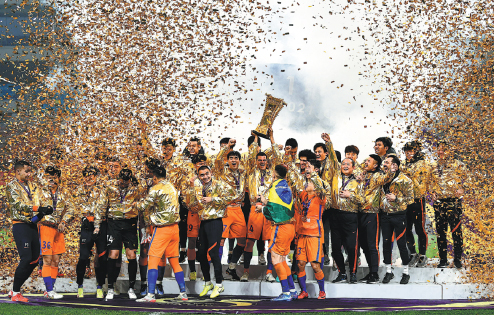Soul-searching needed to revive game
 0 Comment(s)
0 Comment(s) Print
Print E-mail China Daily, January 12, 2022
E-mail China Daily, January 12, 2022

Struggling badly on and off the pitch, Chinese soccer needs a bout of soul-searching to reassess its priorities. That's the view of Chinese Football Association president Chen Xuyuan after perhaps the most underwhelming finish to a season in the domestic game's history.
"We need to take a strong, hard look at the current state of Chinese soccer. We need to sort out all the problems that are hindering the development of the game," Chen said at a CFA meeting on Sunday in Chengdu, Sichuan province.
"Secondly, we need to facilitate the healthy development of the Chinese professional soccer league and clubs... We need to optimize the economic policies and income distribution mechanism. In a relatively short time, we hope to balance the clubs' books."
Domestic soccer's profile has plummeted dramatically over the past season, with Shandong Taishan's CFA Cup final victory over Shanghai Port in Chengdu on Sunday barely registering as a low-ranking trending news item on Chinese social media.
The victory saw Taishan complete a league and cup double after the team, which counts former Manchester United midfielder Marouane Fellaini as perhaps its biggest-name player, was crowned Chinese Super League champion last month.
In a sign of the times, Shandong's CSL triumph also barely caused a ripple on social media amid dwindling interest in the financially stricken domestic game. Many clubs are struggling for survival amid money woes exacerbated by the COVID-19 pandemic.
Chinese soccer's unsustainable finances are highlighted by the CFA's accounts. The governing body said its 2020 revenue totaled about 460 million yuan ($72 million), with expenditure at 470 million yuan. In 2019, the CFA put its revenue at 820 million yuan, outweighed by 860 million yuan in expenditure, again pointing to an obvious lack of profitability.
Over the last decade, CSL clubs have splurged on foreign players and coaches, such as former Chelsea midfielder Oscar and ex-Real Madrid boss Rafa Benitez.
But with the spending spree coming to a grinding halt, the clubs' reliance on private investors, coupled with the effects of the pandemic, have left them badly exposed financially and often mired in debt.
With the league forced to adopting shorter tournament-style seasons played behind closed doors, the pandemic hit clubs' revenue streams, from ticketing to merchandise sales. That has prompted the introduction of spending curbs and salary caps in recent seasons.
Those limits have inevitably led to an exodus of highly salaried foreign players and coaches, including Brazilian forward Hulk and Italian World Cup winner Fabio Cannavaro, the former coach of eight-time CSL champion Guangzhou FC, funded by troubled property giant Evergrande.
Just before the 2021 season kicked off, the CFA announced that six clubs, including 2020 CSL champion Jiangsu FC, had been disqualified from the professional leagues due to financial difficulties.
In November, Chinese media reported that among the 16 CSL teams, 11 were experiencing difficulties paying players' wages, including Guangzhou FC.
"During the winter transfer window before the 2021 season, the total expenditure of all 16 CSL clubs was barely 25 million euro ($28 million)-much less than 400 million euro-plus expenditure for the corresponding period in 2017," read a Titan Sports commentary.
"With the challenges presented by the pandemic, clubs have no choice but to tighten the belt... On the night when Shandong Taishan won its fifth CSL title after 11 years, there were no fans cheering for them in the stands. That's the first time since the start of the Chinese Super League that zero fans attended the league's finale."
There has also been little to cheer in regard to the national team, which is again doomed to missing out on World Cup qualification.
With four games remaining, Team China sits fifth in the six-team Group B of Asian zone qualifying, six points off a third-place playoff spot-its last hope of a route to the 2022 finals in Qatar. The disappointing campaign led to the resignation of head coach Li Tie in November.
Following Li's last game in charge, the 1-1 draw with Australia, naturalized players Alan and Ai Kesen (aka Elkeson) both left China for their native Brazil, claiming to have gone on vacation, while their teammate Luo Guofu (aka Aloisio) announced his departure from Guangzhou FC. It remains unclear if any of the trio will return to play in the remainder of the qualifying campaign.
With only a slim mathematical possibility for Team China to qualify for the 2022 World Cup, new head coach Li Xiaopeng has been urged to focus on the longer-term development of the squad.
"We need to strengthen the structure and management of the national team. We need to devise detailed plans on major tournaments, including the remaining World Cup qualifiers, the next Asian Cup and the 2022 Hangzhou Asian Games," CFA president Chen said on Sunday.
"We also need to facilitate youth soccer development and nurture more talent. Working closely with the General Administration of Sport of China and the Ministry of Education, we need to work on making plans for the growth of youth soccer."





